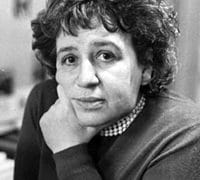Could this woman have been the next Rachmaninov?
mainI have been listening to a pair of Zara Levina (1906-1976), a composer who lived and died under Soviet pressure to conform.
She did what she had to do to get by.
Her first concerto, dated 1942, sounds like an extension of Rachmaninov’s fourth with some personal frills.
Widowed in 1948, she wrote with the censors constantly in mind.
Her second, written the year before she died, is reckless and original – a kind of Hollywood dinner-party conversation between Rachmaninov and Schoenberg.
Brilliantly played by Maria Lettberg and the Berlin radio orchestra, totally absorbing.
Check out the promo video for the new release.






Interesting! Thanks!
Interesting…. a female gender compensation exercise also performance-wise…. although the sentiment of the music is really ‘over the top’, like a blown-up catalogue of ‘Russianness’, it is worthwhile to have dug-up such novelties. It will be fascinating to know what other music has been written we never hear of.
Interesting to reflect on the rather absurd historical situation that while in the West, new music was deleted of expression, emotion, accessibility, beauty, and finally: musical craft, in the East the tonal tradition was put under a glass bell of state surveillance and somehow preserved, in artificial circumstances. It seems to have survived more or less intact but Alexander Lubchenko – young composer carrying-on the tradition – has been arrested recently.
Novelties? !! ” over the top” sentiment ?!..you are absurd. East,west comparisons are ridiculous and devoid of imagination..Lubchenko has been arrested because he commited a crime..applying YOUR ideals internationally stinks of NATIONALISM..reevaluate your own life and apply the proper amount of atonement for your catalog of contrary commentary. Ridiculous little man.
Someone forgot his medicines…. opening the lid of a bucket of frustration, which is understandable because there seems to be a little bit of lack of historical and musical perception.
Music which has been unknown in the West and is uncovered, may count as ‘novelties’, in the sense of something unfamiliar being new to the ears. Norman often makes such finds and that greatly contributes to SD’s interest.
There is a strand in Russian music since Glinka and Borodin – who were still quite restrained in their way – of pumping-up emotion with the most blatant means, and we have to thank Tchaikovsky for many of such abberations (which populate even his best works, alas). With Rachmaninoff this sentimental soufflé sinks-in a bit but still has lots of masochism, and since Shostakovich’s tragic nihilism and acid sarcasm, some of his followers try to outdo him, throwing all available Russian sentiment into one pan and overcook it. Not difficult to hear that.
There has been a period in the last century (the 20th century, from 1900 till 2000), roughly the years 1948 – 1989, which has gone down into history as the ‘Cold War’. In that time, there was a schisma between West- and Eastern Europe, on almost all levels, including the musical level. Historical facts are not nationalistic opinions.
Whether Lubchenko has indeed committed a crime or not is very hard to establish from outside Russia, since within the country all illegal abberations from state institutions as usual during the Soviet era, seem to be back. In Russia, the concepts of reality and truth are as absent as with the new administration in the White House.
That’s something to look forward to. So much unknown music: kudos to the orchestra and Capriccio for bringing it out.
Congratulations to Capriccio. Although this is a beautiful and absorbing forthcoming release, let me bring you actually a more inspired Rachmaninov reminiscences:
Did you ever heard the music of Sverre Jordan (1889-1972)
https://youtu.be/xOl-WXlRdLo
Probably it will make your heart cry for do not know it.
Sympathetic music in the best of 19C piano concerto tradition…. The problem with this music is not that the idiom is reminiscent of Rachmaninoff, or that both have the same sources, but that Jordan’s piece folows the obvious route again and again: he writes what the patterns suggest and Rachmaninoff is much more subtle in playing with expectation and deviation.